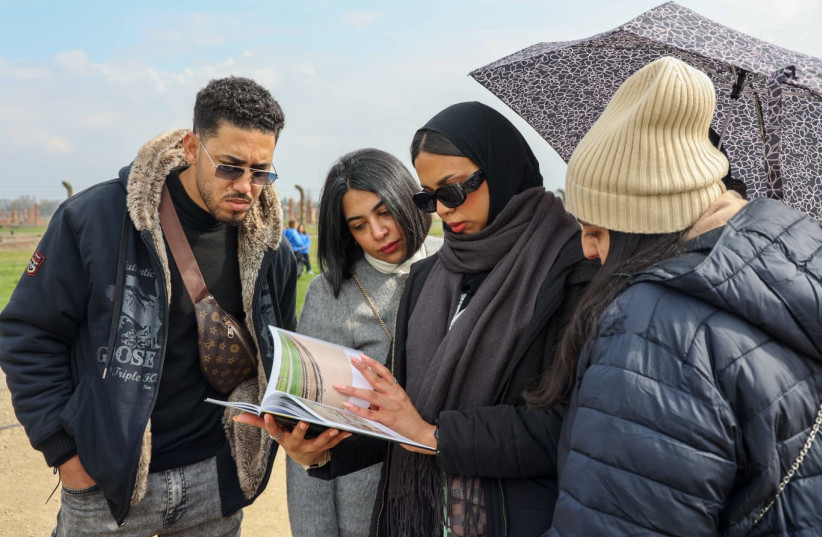The first time I visited Auschwitz, I wept. This in itself is not unusual.
But when I wept, I wasn’t alone. I was with a delegation of 12 Arab and Muslim individuals – social-media influencers, professors and journalists, including Saudis, Bahrainis, Syrians, Lebanese, Moroccans, Turks, Israeli Arabs and Palestinians. And when I was overcome with emotion, I felt a comforting arm of a delegation member wrap around me.
Before attending the march, he may never have spent much time thinking about the six million who perished in the Holocaust, unlike most Jews who have that figure emblazoned on their psyche. But in that very moment, his empathy for our tragedy demonstrated that in sadness, there is unity.
That delegation took part in March of the Living, the annual three-kilometer walk from the concentration camp at Auschwitz to the extermination camp of Birkenau in Poland. They arrived as guests of the Tolerance Program of Sharaka, a non-governmental initiative that grows the impact of the Abraham Accords by transforming the vision of people-to-people peace between Israel and its Arab neighbors into a reality. It was the first time that a pan-Arab delegation publicly partook in such a solidarity march.
It is bittersweet, of course, that we often find unity in the bleaker aspects of life but when we understand the history of a tragedy like the Holocaust, it becomes clear that while this happened specifically to the Jews, it can happen to anyone, anywhere. And at times, exposure to the worst of what humanity is capable of is what we need to propel ourselves beyond societal blockades.

At March of the Living, one’s religion and nationality are irrelevant in the fight against eradicating baseless hate.
The Arab delegation joining the March of the Living
This week, with the support of the Claims Conference, Sharaka once again brought a delegation of Arab influencers to the march. This time, the group was 22 individuals who arrived in Poland as part of our first-of-its-kind year-long program that promotes tolerance through Holocaust education.
THROUGHOUT THE year, Sharaka hosted three such delegations, who visited Yad Vashem and other Holocaust institutes in Israel and Poland where some partook in March of Living where they watched virtual lectures about the Holocaust and other genocides, as well. In doing so, the group learned how to promote the values of tolerance and how to counter radical ideologies in their own societies.
The delegation was a small but necessary step in breaking through social taboos and bringing people closer together when politics, prejudice and division have been aiming to drive us apart.
March of the Living offers a powerful impetus to ignite that change. Rather than paying a visit to a museum, participants took part in a ceremony where survivors and their family members shared their accounts of grief and horror. And when they cried, they had thousands of others crying with them.
Moreover, as Holocaust survivors continue to pass on, leaving very few to share their stories, our window of opportunity to bring this visceral experience to them is dwindling.
Like most who visit Auschwitz, Arab visitors carry with them complex emotions. In my conversations with them, some have expressed remorse that they never meaningfully understood the magnitude of the Holocaust before, as their government either minimized or ignored Holocaust education. Others have expressed shame that they hail from countries spreading disinformation about the Holocaust.
To each of them, I responded that it’s not too late to be an ambassador for change.
As headlines continue to focus on what’s dividing Israeli society, the Abraham Accords have always been and always should be a source of unity. But for such agreements to be effective, the people on the ground must be active proponents of peace and cooperation.
The March of the Living experience and Holocaust education more broadly are some of the myriad ways individuals from disparate backgrounds can look at each other in the eye and declare resolutely in a unified voice, “Never again.”
The writer is the executive director of Sharaka, a nonprofit, non-governmental initiative based in Israel, Bahrain and Morocco, that works to build people-to-people peace and engagement. Sharaka’s Holocaust Education program is conducted with the support of the Claims Conference.
